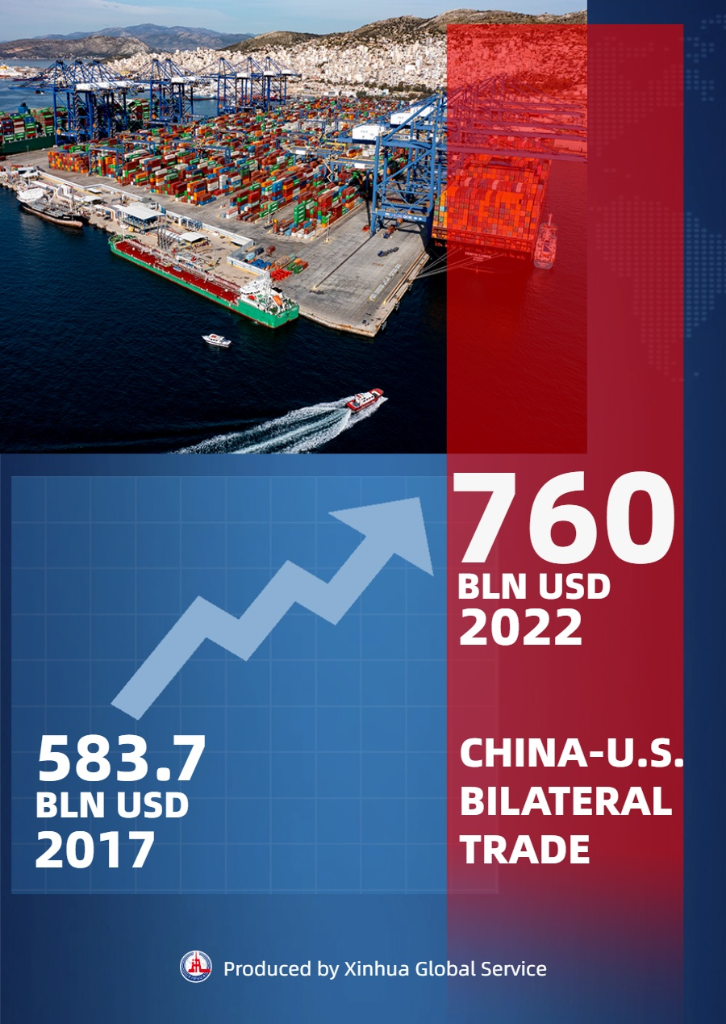
BEIJING, Nov. 20 (Xinhua) -- Following the highly anticipated summit between President Xi Jinping and his U.S. counterpart, Joe Biden, last week, there is growing optimism that increased communication, dialogue and consultation between the world's two largest economies will strengthen cooperation, align common interests and add much-needed certainty to the evolving global landscape.
Bilateral economic and trade cooperation, long seen as the stabilizing force and driving factor in China-U.S. relations, is among the first to experience a thaw, as a series of dialogues and exchanges in this regard has sent a positive signal to both sides and the global economy.
DISCUSSIONS MATTER
One of the key consensuses reached between China and the United States during the San Francisco summit meeting is that the two sides decided to step up high-level interactions, and agreed to start consultations on extending the China-U.S. Science and Technology Cooperation Agreement, and on resuming the China-U.S. Joint Committee on Cooperation in Agriculture.
Rather than seeking economic "decoupling," the two sides have welcomed the development of healthy economic relations, according to top Chinese and U.S. economic officials.
China and the United States have agreed to enhance communication, seek consensus, manage disputes, and avoid misunderstandings that may lead to unintended escalation, noted China's Vice Finance Minister Liao Min, citing talks between Chinese Vice Premier He Lifeng and U.S. Secretary of Treasury Janet Yellen before the summit.
"The China-U.S. economic relation takes roots in the two countries' common interests in the economic field," Liao told media after He and Yellen concluded several rounds of talks in San Francisco.
Chinese and U.S. commerce ministers also met on the sidelines of the 30th APEC Economic Leaders' Meeting. It was the first ministerial-level talk after a new communication mechanism was announced when U.S. Commerce Secretary Gina Raimondo visited China in August.
While both governments agreed to step up exchanges in relevant fields, the two sides had in-depth exchanges on national security issues pertaining to the economic field.
It was very important to have such discussions, said Commerce Minister Wang Wentao at the meeting, as overstretching and politicizing of the concept of national security would impact regular trade and investment activities.

CONSTRUCTIVE ENGAGEMENT
Kristalina Georgieva, managing director of the International Monetary Fund, has hailed the Xi-Biden summit as "a constructive engagement."
"It sends a massively important signal that cooperation can bring benefits to everyone," she said in her opening remarks at the APEC Economic Leaders' Meeting Friday, expressing appreciation from a global economic perspective.
The business circle echoed a similar sentiment. The American Chamber of Commerce in Shanghai (AmCham Shanghai), in a statement after the summit, also called the talks "a positive signal," noting that "the two countries are committed to managing the world's most important geopolitical relationship."
"A stable U.S.-China relationship is also crucial for raising the confidence of American companies in China and will benefit the American people," the AmCham Shanghai said.
At the sixth China International Import Expo in Shanghai earlier this month, a total of 505 million U.S. dollars worth of deals were signed by exhibitors participating in the American Food and Agriculture Pavilion.
The pavilion, co-hosted by the United States Department of Agriculture and AmCham Shanghai, marks the first U.S. government participation in the expo in six years.

Robust agricultural trade mirrors the strong resilience of China-U.S. trade, which has not been dampened by either trade disputes or the pandemic in recent years. In 2022, total two-way trade hit a record high of nearly 760 billion U.S. dollars, Chinese official data showed.
Apart from efforts to improve relations, China and the United States, which together account for over one-third of the world economy, have also agreed to join hands against common challenges related to economic growth, financial stability and regulation, according to Vice Minister Liao.
The two countries will also cooperate on climate-related economic issues and the debt issues of low-income and emerging economies, strengthen the international financial structure, and push forward reform at multilateral development banks to make them better, larger and more effective.
However, the Chinese side has also stressed the need to maintain equality and mutual respect in future bilateral cooperation.
"China-U.S. economic and trade relations will truly sustain stable development only when the legitimate concerns of both sides be properly responded to," Liao said at the media briefing.
信息網(wǎng)絡(luò)傳播視聽節(jié)目許可證:120330032
中華人民共和國(guó)互聯(lián)網(wǎng)新聞信息服務(wù)許可證:45120170002
中華人民共和國(guó)互聯(lián)網(wǎng)出版許可證 (署)網(wǎng)出證(桂)字第020號(hào)
廣播電視節(jié)目制作經(jīng)營(yíng)許可證編號(hào):(桂)字第0230號(hào)
網(wǎng)警備案號(hào):45010302000253
桂ICP備11003557 南寧新聞網(wǎng)版權(quán)所有
舉報(bào)電話:0771—5530647 郵箱:mail@nnnews.net
登錄
還沒賬號(hào)?立即注冊(cè)
點(diǎn)擊頭像快速登錄
請(qǐng)輸入驗(yàn)證碼